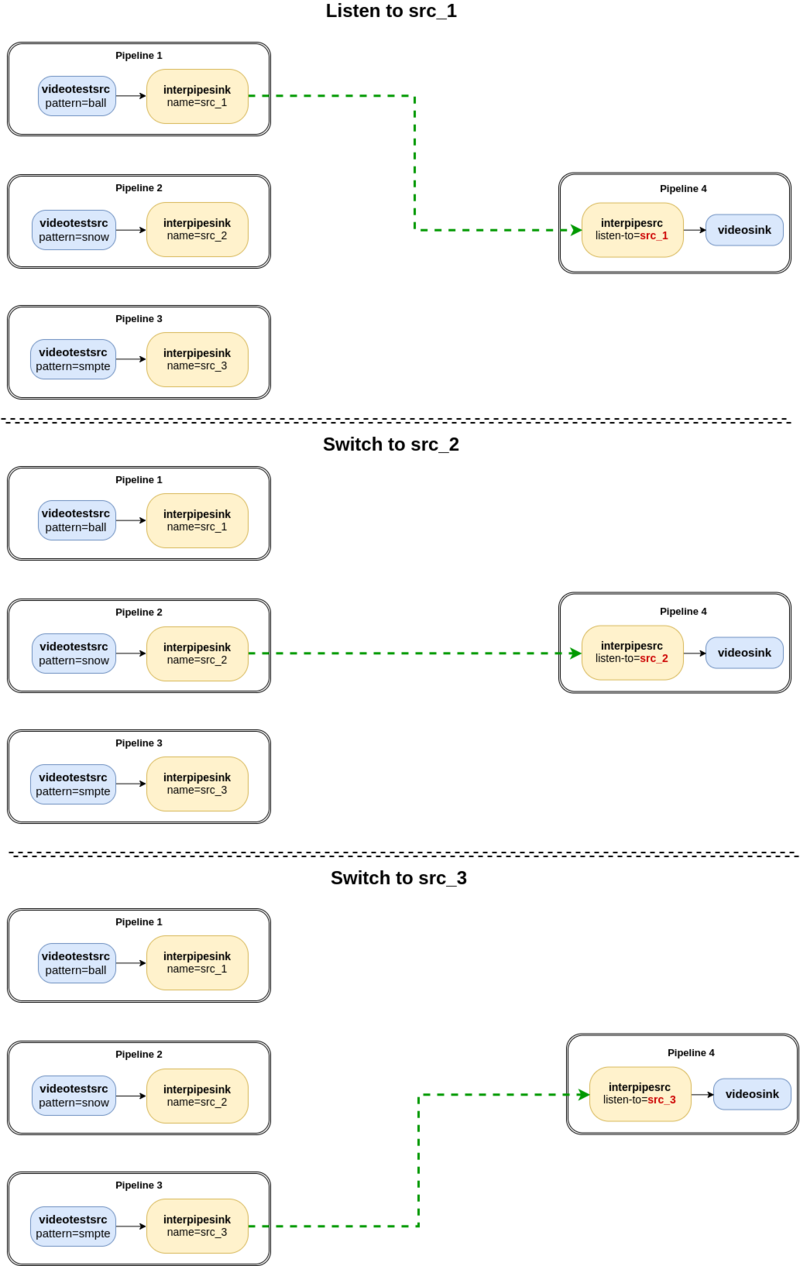Example 1: CCTV
Open-source project from RidgeRun. |
This page contains an example to demonstrate the usage of the interpipesink and interpipesrc elements.
This example demonstrates the usage of the dynamic switching property of the GstInterpipe. The objective of this sample is to show the simplicity that GstInterpipe offers in a real case of use where you have different source pipelines and one sink pipeline, and you want to alternate the source that is connected with the sink pipeline. For example, a Closed Circuit Television (CCTV) system.
In this sample there are 3 source pipelines labeled as: scr_pipe_1, scr_pipe_2, scr_pipe_3. Each source pipeline is a videotestsrc with a different pattern (simulating different real cameras connected to a system). On the other side, there is 1 sink pipeline, which is labeled as sink_pipe_4. This sink pipeline consists of a videosink that displays on-screen the video buffers it receives.
In the sample, the source pipeline periodically (each 3 s) changes the source pipeline it is listening to, so you will see a different video pattern on the rendering screen.
As you can see from the sample code, to change the source pipeline that the sink pipeline is listening to, it is as easy as changing the value of the interpipesrc element "listen-to" property with the name of the desired interpipesink to listen to.
The below diagram illustrates the concept.

Sample bash script code:
#!/bin/bash echo -e "\n ====== CCTV Example (Switch the scr_pipe to listen in runtime) ====== \n" STOP=0 # Graceful cleanup upon CTRL-C trap "STOP=1" SIGINT # Create pipelines echo -e "\n ====> Create the scr_pipe_1 \n" gstd-client pipeline_create pipe_1_src videotestsrc pattern=ball is-live=true \ ! "video/x-raw, framerate=15/1, width=640, height=480" ! queue ! interpipesink name=src_1 \ caps=video/x-raw,width=640,height=480,framerate=15/1 sync=false async=false echo -e "\n ====> Create the scr_pipe_2 \n" gstd-client pipeline_create pipe_2_src videotestsrc pattern=snow is-live=true \ ! "video/x-raw, framerate=15/1, width=640, height=480" ! queue ! interpipesink name=src_2 \ caps=video/x-raw,width=640,height=480,framerate=15/1 sync=false async=false echo -e "\n ====> Create the scr_pipe_3 \n" gstd-client pipeline_create pipe_3_src videotestsrc pattern=smpte is-live=true \ ! "video/x-raw, framerate=15/1, width=640, height=480" ! queue ! interpipesink name=src_3 \ caps=video/x-raw,width=640,height=480,framerate=15/1 sync=false async=false echo -e "\n ====> Create the sink_pipe_4 (listener) \n" gstd-client pipeline_create pipe_4_sink interpipesrc name=interpipesrc1 listen-to=src_1 \ is-live=true allow-renegotiation=true stream-sync=compensate-ts ! queue ! fpsdisplaysink async=false sync=false # Change pipelines to PLAYING STATE echo -e "\n ====> Change to PLAYING STATE \n" gstd-client pipeline_play pipe_4_sink gstd-client pipeline_play pipe_1_src gstd-client pipeline_play pipe_2_src gstd-client pipeline_play pipe_3_src echo -e "\n ====> Every 3 seconds the sink_pipe will change the src_pipe that is listening to \n" echo -e "\n ====> Start listening to scr_pipe_1 \n" sleep 3 # Start alternating the source pipeline being listened while : do gstd-client element_set pipe_4_sink interpipesrc1 listen-to src_2 echo -e "\n ====> Change to listening to scr_pipe_2 \n" sleep 3 if [ $STOP -ne 0 ] then break fi gstd-client element_set pipe_4_sink interpipesrc1 listen-to src_3 echo -e "\n ====> Change to listening to scr_pipe_3 \n" sleep 3 if [ $STOP -ne 0 ] then break fi gstd-client element_set pipe_4_sink interpipesrc1 listen-to src_1 echo -e "\n ====> Change to listening to scr_pipe_1 \n" echo -e "\n ====> Type Ctrl+C to stop the example execution, otherwise it will iterate infinitely!\n" sleep 3 if [ $STOP -ne 0 ] then break fi done # Delete Pipelines gstd-client pipeline_delete pipe_1_src gstd-client pipeline_delete pipe_2_src gstd-client pipeline_delete pipe_3_src gstd-client pipeline_delete pipe_4_sink echo -e "\n ====> CCTV Example Finished!!! \n"
To run the sample follow these steps:
- Build and install GStreamer Daemon (gstd): Building GStreamer Daemon.
- Copy the script code in a file
- Change the file permissions to be executable:
- chmod 777 <file.sh>
- Run the GStreamer Daemon:
- gstd &
- Run the script:
- ./<file.sh>
- Kill the GStreamer Daemon:
- killall gstd
Tested versions:
- GStreamer version: v1.8.3
- GStreamer Daemon: v0.11.3
- GstInterpipe: v1.1.3



